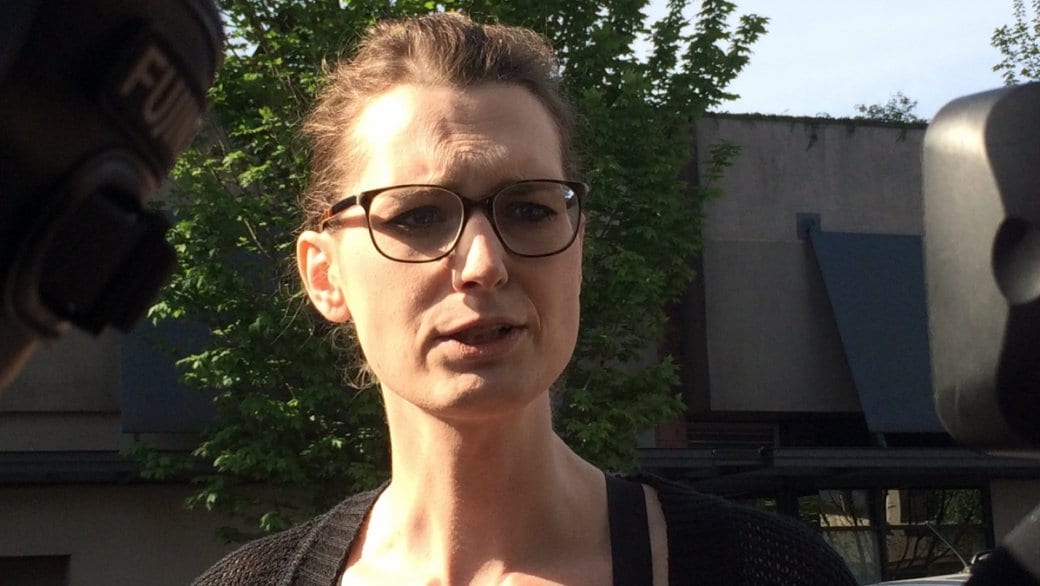The woman accused of burning a Pride flag at the University of British Columbia last year won’t be going to trial after all.
Brooklyn Marie Fink was scheduled to stand trial for mischief in March 2017, but Crown prosecutors suddenly dropped the charge against her on Dec 6, 2016.
Though Fink pleaded not guilty and asked the court to dismiss the charge against her, she admitted to burning the Pride flag when she appeared in court last May. But it was an act of political protest, she insists, not a crime. Fink says she burned the flag to object to a non-UBC flag hoisted on the UBC flagpole; that it was a Pride flag was particularly galling since, as a transsexual woman who wants nothing to do with transgender activism, she says LGBT politics are ruining her life.
Crown prosecutors dropped the charge against Fink after deciding the likelihood of convicting her was low.
Charges are only approved if prosecutors think there’s sufficient evidence for a conviction and if the prosecution is considered in the public interest, spokesperson Dan McLaughlin explained to Xtra in an email.
If prosecutors decide at any time during a case that its likelihood of conviction has dropped, they can stop the proceedings. “That is what occurred here,” McLaughlin says.
After Fink burned the flag, some UBC students said they felt unsafe. “This is a suspected hate crime of intentional destruction to a very publicly important symbol for the LGBTQ+ community,” the UBC Pride Collective said in a statement last February.
Asked how the Crown responds to the students’ suggestion that it was a hate crime, McLaughlin declined to comment. The charge was initially approved and the case prosecuted, he notes, but since it’s no longer before the court it would be improper to comment further on the allegations, he says.
Asked if the flag burning was a political statement or a crime, McLaughlin again declined to comment. Since the charge has been dropped, it would be inappropriate “to speculate as to the motivations for the incident or attempt to characterize the incident further,” he repeats.
The UBC Pride Collective did not comment by posting time on the Crown’s decision to drop the charge.
Fink declined to be interviewed for this story but in an email exchange with Xtra said she won her case when the Crown dropped the charge.
Fink indicated in the email that she’s trying to resume her studies at UBC but says the university is still evaluating her application and demanding another psychological assessment (which she intends to challenge).
Last May, Fink told Xtra she was still waiting to hear if the president of UBC would expel her completely or readmit her with or without conditions, after a non-academic misconduct hearing earlier that month. At the time, she was prohibited from entering the Point Grey campus.
A UBC spokesperson declined to comment on Fink’s enrolment status now, or the outcome of her misconduct hearing, for privacy reasons.
In a Jan 3 email to Xtra, Fink threatened to sue UBC and the Ubyssey newspaper for defamation, harassment and “the loss of ability to live life as a female.” She alleges they discriminated against her because of her political beliefs.
“I am confident that I will win and collect damages,” Fink writes. “I identify as a heterosexual woman. Let that sink in. Now Google my name and read all the slander and libel about ‘confessed arsonist,’ ‘transtrender,’ and ‘describes herself as transsexual.’”
“I’m not going to slink into the darkness,” she continues. “I’m not going to kill myself. I am going to end the evil political revolution of Herbert Marcuse and be a leader for my people; whether the postmodernists like it or not.”

 Why you can trust Xtra
Why you can trust Xtra


